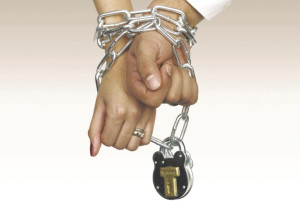The Ministry of Justice has announced plans to bring in tougher penalties for those who break a Forced Marriage Protection Order (FMPO), which uses civil law to protect those at risk of being forced into a marriage.
Forced marriage – legally defined as any marriage in which one or both individuals do not or cannot consent to the union, but are nevertheless coerced into it – is currently partially safeguarded against in the UK by pre-existing legislation against such offences as kidnapping, false imprisonment, assault, harassment, child cruelty, child abduction and various sex offences.
However, there is currently no legislation which makes forced marriage itself a crime.
At the moment FMPOs go some way towards this, by offering a specific civil remedy. FMPOs can be made by county courts for the purposes of protecting those at risk of being forced into a marriage, or even those who have already been forced.
Individual courts can include in an FMPO whatever restrictions it considers necessary. For example, provisions not to threaten, harass or use force against the person concerned; to surrender the person’s passport or other travel document; and not to enter into any arrangements for engagement or marriage of the person to be protected, whether civil or religious, in the UK or abroad.
Under current laws, the breach of an FMPO is treated as a civil contempt of court, and can thus be punished by either a fine or a custodial sentence of up to two years.
Currently, speedy enforcement for a breach depends on whether the court attaches a power of arrest to the order. If a power of arrest is attached, a police officer may arrest without warrant a person suspected of breaching their order. If no power of arrest is attached to the order and it is breached, the victim must apply to the civil court for an arrest warrant.
Soon, however, these safeguards are set to become far more stringent.
Under the new Anti-social Behaviour, Crime and Policing (ASBCP) Bill introduced on 9 May, there are plans to have new measures implemented which will make both forced marriage and the breach of an FMPO a criminal offence.
The new offence of forcing a person to marry will be triable in a criminal court, carrying a maximum sentence of 7 years imprisonment, a fine or both. Breaching an FMPO will likewise be triable in a criminal court, with a maximum sentence of 5 years imprisonment, a fine or both.
Work on the new legislation is being carried out by two government departments, with the Home Office leading on the offence of forcing a person to marry, and the Ministry of Justice on the offence of breaching an FMPO.
However, the ASBCP Bill must still complete its passage through both Houses of Parliament and receive Royal Assent before it can become law.
Discussing the proposed changes, Justice Minister and Conservative MP Damian Green said, “Forced marriage is abhorrent and little more than slavery. To force anyone into marriage against their will is simply wrong and this continued practice in modern Britain is a stain on our social fabric.
“That is why we are legislating to make it illegal.”
Between 2008 and 2012 a reported 491 FMPOs were taken out, of which two in 2012 were for persons under the age of 9. The Ministry of Justice reports that in the past twelve months the greatest number of those taken out were in the North West, which made up 30% of the total figure. 16% were taken out in London.
Nevertheless, FMPOs remain an obscure legal process for most. This week a press officer for the Ministry of Justice admitted that while they “can be very helpful,” “many people do not know that Forced Marriage Protection Orders exist.”
While the various sections of the ASBCP Bill are still making their way through Parliament, those parts which seek to criminalise forced marriage will be widely welcomed by many former victims and campaigners, such as Jasvinder Sanghera, founder of the charity Karma Nirvana.
Sanghera, a Sikh from Derby, was the youngest of a line of daughters sent to India to marry men they had never met. She ran away from home at 15 to escape a similar fate. When one of her older sisters later committed suicide to escape the domestic abuse of her forced marriage, she set up the charity Karma Nirvana to raise awareness around the issue, which she dubs “a secret that shames Britain.”
“Forced marriages rob you of a childhood – our victims have the most horrific of crimes committed against them here in Britain. As cases increase so must awareness, legal remedies and a strong message to perpetrators,” says Sanghera.
“Strengthening Forced Marriage Protection Orders reinforces the serious approach we are taking to tackle these abuses. All these measures remind victims that forced marriages are a crime not part of culture, tradition and that they will be believed and supported if they report.”
Although the majority of forced marriage cases in the UK involve women with Indian, Pakistani and Bangladeshi backgrounds, the problem extends beyond those from Asian communities. The charity Refuge claims that 2% of known forced marriages in the UK in 2008 involved families from Africa.
According to Refuge, victims of forced marriage from UK African families were most often those with a background in the North East of the continent, namely Djibouti, Egypt, Eritrea, Ethiopia, Somalia, and Sudan. Refuge also cite at least one Nigerian case in the UK.
For Karma Nirvana, the most crucial step to be taken is that which eliminates any “mistaken assumption” that the “cultural” backgrounds of those families involved in forced marriage – whether Asian, African, Middle Eastern or otherwise – somehow legitimate the act.
“It is not a cultural problem, it is abuse,” explained Sanghera in a 2011 interview with the BBC.
“The sooner people start to regard forced marriage in the same way they do domestic violence the better it will be for those affected by it.”











